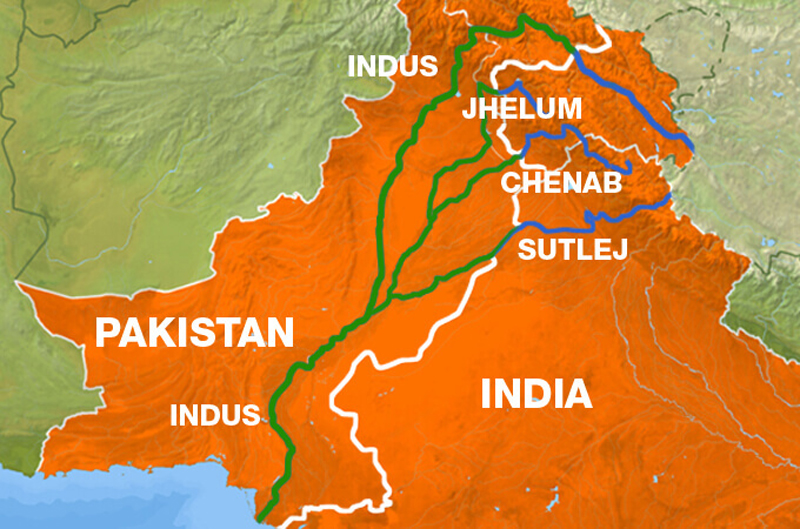NEW DELHI, Jan 27: For the first time, India has issued a notice to Pakistan seeking a review and modification of the Indus Water Treaty (IWT) in view of Islamabad’s “intransigence” to comply with the dispute redressal mechanism of the pact that was inked over six decades back for matters relating to cross-border rivers, Government sources said today.
The notice, sent by India’s Indus water commissioner to his Pakistani counterpart on January 25 under the provisions of the pact, seeks Islamabad’s response within 90 days for intergovernmental negotiations to “rectify the material breach” of IWT.
Government sources said India’s call for the review and modification of the pact is not specific to the dispute resolution mechanism only, and that the negotiations could cover various other provisions of the pact based on experiences gained over the last 62 years.
India’s significant step comes around 10 months after the World Bank announced appointing a neutral expert and a chair of the Court of Arbitration under two separate processes to resolve the differences over the Kishenganga and Ratle Hydro Electric Projects following Islamabad’s refusal to address the matter through talks between the two commissioners.
The sources said India considers the start of the two concurrent processes to resolve the dispute violates the provision of the three-step graded mechanism prescribed in the pact and wondered what will happen if the mechanisms come out with contradictory judgments.
India and Pakistan signed IWT on September 19, 1960, after nine years of negotiations, with the World Bank being a signatory of the pact which sets out a mechanism for cooperation and information exchange between the two sides on the use of waters of a number of cross-border rivers.
“The objective of the notice for modification is to provide Pakistan an opportunity to enter into intergovernmental negotiations within 90 days to rectify the material breach of IWT. This process would also update IWT to incorporate the lessons learned over the last 62 years,” said a source.
They said the immediate trigger to send the notice was Pakistan’s “intransigence” for a solution to the differences over the Kishenganga and Ratle Hydro Electric Projects as per provisions of the IWT.
Under the pact, any differences need to be resolved under a three-stage approach. However, in the case of Kishenganga and Ratle Hydro Electric Projects, the World Bank started two concurrent dispute redressal processes at the insistence of Pakistan that India felt was a breach of the IWT.
The sources said India has always been a steadfast supporter and a responsible partner in implementing IWT in letter and spirit.
“However, Pakistan’s actions have adversely impinged on the provisions of IWT and their implementation, and forced India to issue an appropriate notice for modification of the pact,” said a source.
In 2015, Pakistan requested the appointment of a neutral expert to examine its technical objections to India’s Kishenganga and Ratle Hydro Electric Projects (HEPs).
In 2016, Pakistan unilaterally retracted this request and proposed that a Court of Arbitration adjudicate on its objections, sources said.
They said this “unilateral action” by Pakistan is in contravention of the graded dispute settlement mechanism envisaged by Article IX of IWT.
Accordingly, India made a separate request for the matter to be referred to a neutral expert.
“The initiation of two simultaneous processes on the same questions and the potential of their inconsistent or contradictory outcomes creates an unprecedented and legally untenable situation, which risks endangering IWT itself,” the source said.
“The World Bank acknowledged this itself in 2016, and took a decision to ‘pause’ the initiation of two parallel processes and request India and Pakistan to seek an amicable way out,” it said.
The sources said that despite repeated efforts by India to find a mutually agreeable way forward, Pakistan refused to discuss the issue during the five meetings of the Permanent Indus Commission from 2017 to 2022.
At Pakistan’s continuing insistence, the World Bank last year initiated actions on both the neutral expert and Court of Arbitration processes, they said, adding such parallel consideration of the same issues is not covered under any provision of IWT. It is learnt that the Court of Arbitration is holding its first hearing in The Hague.
“Faced with such violation of IWT provisions, India has been compelled to issue a notice of modification,” the source cited above said.
Under the provisions of the IWT, in case of any questions on any project or initiative, the Indus commissioners attempt to resolve them under the first step. If they fail, then the questions become “differences” and the World Bank has to appoint “neutral experts”.
If the “neutral experts” fail to find a resolution, then the differences become disputes and, in such a scenario, the World Bank has to appoint a Court of Arbitration to find a way out, the sources said.
In the case of Kishenganga and Ratle Hydro Electric Projects (HEPs), Pakistan asked for the appointment of neutral experts in 2015. Subsequently, it demanded the appointment of the Court of Arbitration in 2016 skipping the second stage of the dispute redressal, they said.
In 2016, the World Bank followed the processes of finding a resolution by the neutral experts as well as the CoA following Pakistan’s insistence. India, at that point, wondered what would happen if the two mechanisms came out with contradictory outcomes, the sources said. (PTI)


